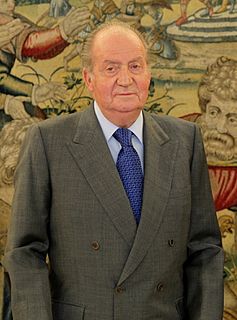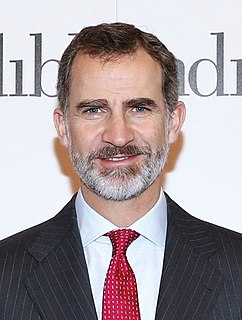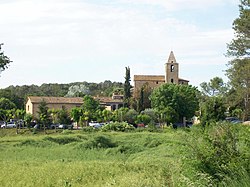
Andalusia is an autonomous community in southern Spain. It is the most populous, and the second largest autonomous community in the country. The Andalusian autonomous community is officially recognised as a "historical nationality". The territory is divided into eight provinces: Almería, Cádiz, Córdoba, Granada, Huelva, Jaén, Málaga and Seville. Its capital is the city of Seville.

Colombia, officially the Republic of Colombia, is a sovereign state largely situated in the northwest of South America, with territories in Central America. Colombia shares a border to the northwest with Panama, to the east with Venezuela and Brazil and to the south with Ecuador and Peru. It shares its maritime limits with Costa Rica, Nicaragua, Honduras, Jamaica, Haiti, and the Dominican Republic. Colombia is a unitary, constitutional republic comprising thirty-two departments, with the capital in Bogotá.

The Canary Islands is a Spanish archipelago and the southernmost autonomous community of Spain located in the Atlantic Ocean, 100 kilometres west of Morocco at the closest point. The Canary Islands, which are also known informally as the Canaries, are among the outermost regions (OMR) of the European Union proper. It is also one of the eight regions with special consideration of historical nationality recognized as such by the Spanish Government. The Canary Islands belong to the African Plate like the Spanish cities of Ceuta and Melilla, the two on the African mainland.

Francisco Franco Bahamonde was a Spanish general and politician who ruled over Spain as a military dictator from 1939, after the nationalist victory in the Spanish Civil War, until his death in 1975. This period in Spanish history is commonly known as Francoist Spain.

Spain, officially the Kingdom of Spain, is a country mostly located in Europe. Its continental European territory is situated on the Iberian Peninsula. Its territory also includes two archipelagoes: the Canary Islands off the coast of Africa, and the Balearic Islands in the Mediterranean Sea. The African enclaves of Ceuta, Melilla, and Peñón de Vélez de la Gomera make Spain the only European country to have a physical border with an African country (Morocco). Several small islands in the Alboran Sea are also part of Spanish territory. The country's mainland is bordered to the south and east by the Mediterranean Sea except for a small land boundary with Gibraltar; to the north and northeast by France, Andorra, and the Bay of Biscay; and to the west and northwest by Portugal and the Atlantic Ocean.

Spanish or Castilian is a Romance language that originated in the Castile region of Spain and today has hundreds of millions of native speakers in the Americas and Spain. It is a global language and the world's second-most spoken native language, after Mandarin Chinese.

The Spanish–American War was an armed conflict between Spain and the United States in 1898. Hostilities began in the aftermath of the internal explosion of USS Maine in Havana harbor in Cuba, leading to U.S. intervention in the Cuban War of Independence. The war led to emergence of U.S. predominance in the Caribbean region, and resulted in U.S. acquisition of Spain's Pacific possessions. That led to U.S. involvement in the Philippine Revolution and ultimately in the Philippine–American War.
The Campeonato Nacional de Liga de Primera División, commonly known as La Liga, is the men's top professional football division of the Spanish football league system. Administered by the Liga Nacional de Fútbol Profesional, also known as the Liga de Fútbol Profesional (LFP), La Liga is contested by 20 teams, with the three lowest-placed teams at the end of each season relegated to the Segunda División and replaced by the top three teams in that division.

Philip II was King of Spain (1556–98), King of Portugal, King of Naples and Sicily, and jure uxoris King of England and Ireland. He was also Duke of Milan. From 1555 he was lord of the Seventeen Provinces of the Netherlands.

In Spain, an autonomous community is a first-level political and administrative division, created in accordance with the Spanish constitution of 1978, with the aim of guaranteeing limited autonomy of the nationalities and regions that make up Spain.

Juan Carlos I is a former King of Spain, reigning from 1975 until his abdication in 2014.

Felipe VI is the King of Spain. He ascended the throne on 19 June 2014 upon the abdication of his father, King Juan Carlos I. His mother is Queen Sofía, and he has two older sisters, Infanta Elena, Duchess of Lugo, and Infanta Cristina. When Spanish dictator Francisco Franco chose Juan Carlos as his successor in 1969, Felipe became second in line to the Spanish throne.

Charles II of Spain, also known as El Hechizado or the Bewitched, was the last Habsburg ruler of the Spanish Empire. He is now best remembered for his physical disabilities, believed to be the result of inbreeding, and the war for his throne that followed his death.

Francoist Spain, known in Spain as the Francoist dictatorship, officially known as the Spanish State from 1936 to 1947 and the Kingdom of Spain from 1947 to 1975, is the period of Spanish history between 1936 and 1975, when Francisco Franco ruled Spain as dictator with the title Caudillo.

The Spanish Empire, historically known as the Hispanic Monarchy and as the Catholic Monarchy, was one of the largest empires in history. From the late 15th century to the early 19th, Spain controlled a huge overseas territory in the New World and the Asian archipelago of the Philippines, what they called "The Indies". It also included territories in Europe, Africa and Oceania. The Spanish Empire has been described as the first global empire in history, a description also given to the Portuguese Empire. It was the world's most powerful empire during the 16th and first half of the 17th centuries, reaching its maximum extension in the 18th century. The Spanish Empire was the first empire to be called "the empire on which the sun never sets".

The Spain national football team represents Spain in international men's association football since 1920, and is controlled by the Royal Spanish Football Federation, the governing body for football in Spain.

Gibraltar is a British Overseas Territory located at the southern tip of the Iberian Peninsula. It has an area of 6.7 km2 (2.6 sq mi) and is bordered to the north by Spain. The landscape is dominated by the Rock of Gibraltar at the foot of which is a densely populated town area, home to over 30,000 people, primarily Gibraltarians.

The Spanish Civil War took place from 1936 to 1939. Republicans loyal to the left-leaning Second Spanish Republic, in alliance with the Anarchists and Communists, fought against the Nationalists, an alliance of Falangists, Monarchists, and Catholics, led by General Francisco Franco. Due to the international political climate at the time, the war had many facets, and different views saw it as class struggle, a war of religion, a struggle between dictatorship and republican democracy, between revolution and counterrevolution, between fascism and communism. The Nationalists won the war in early 1939 and ruled Spain until Franco's death in November 1975.

Madrid is the capital of Spain and the largest municipality in both the Community of Madrid and Spain as a whole. The city has almost 3.3 million inhabitants and a metropolitan area population of approximately 6.5 million. It is the third-largest city in the European Union (EU), smaller than only London and Berlin, and its monocentric metropolitan area is the third-largest in the EU, smaller only than those of London and Paris. The municipality covers 604.3 km2 (233.3 sq mi).






















